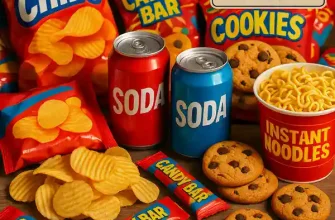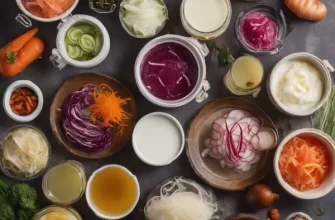Most people trying to manage cholesterol want clear, practical guidance—not another list of forbidden foods or magic promises. The truth is, what you eat every day makes a measurable difference. Some foods help your body reduce LDL (“bad”) cholesterol and boost HDL (“good”) cholesterol naturally.
Top 10 Foods for Cholesterol Control
This infographic highlights ten scientifically proven foods that help regulate blood cholesterol levels. Each bar represents the relative effectiveness of the food on a 10-point scale, with serving recommendations, usage variations, and estimated monthly costs for an average adult diet.
1. Oats and Barley
Effectiveness: 9.5/10 | Forms: Oatmeal, barley soup | Recommended: 3 bowls/week | Cost: $5–6 (≈€4.50–5.50)/month
2. Fatty Fish (Salmon, Mackerel, Sardines)
Effectiveness: 9/10 | Forms: Grilled, baked, or canned | Recommended: 2–3 servings/week | Cost: $25–30 (≈€23–28)/month
3. Nuts (Almonds, Walnuts, Sunflower Seeds)
Effectiveness: 8.5/10 | Forms: Raw or roasted (unsalted) | Recommended: 1 oz (30 g)/day | Cost: $15–18 (≈€14–16)/month
4. Avocado
Effectiveness: 8/10 | Forms: In salads, spreads, or raw | Recommended: 2–3 avocados/week | Cost: $10–12 (≈€9–11)/month
5. Olive Oil
Effectiveness: 7.8/10 | Forms: For cooking or dressings | Recommended: 2 tbsp/day | Cost: $8–10 (≈€7–9)/month
6. Apples and Citrus Fruits
Effectiveness: 7.5/10 | Forms: Fresh, raw, or smoothies | Recommended: 1–2 fruits/day | Cost: $12–14 (≈€11–13)/month
7. Legumes (Beans, Lentils, Chickpeas)
Effectiveness: 7.3/10 | Forms: Soups, salads, or stews | Recommended: 3 cups/week | Cost: $6–8 (≈€5–7)/month
8. Spinach and Leafy Greens
Effectiveness: 7/10 | Forms: Fresh salads, smoothies | Recommended: 3–4 cups/week | Cost: $8–9 (≈€7–8)/month
9. Soy Products (Tofu, Soy Milk)
Effectiveness: 6.8/10 | Forms: Stir-fry, soy milk, soups | Recommended: 2 servings/week | Cost: $10–12 (≈€9–11)/month
10. Green Tea
Effectiveness: 6.5/10 | Forms: Hot or iced tea | Recommended: 1–2 cups/day | Cost: $4–6 (≈€3.50–5.50)/month
Source: iytmed.com
Let’s Talk Food – The Real Cholesterol Fighters
You don’t have to change your entire lifestyle overnight. Start by adding foods that support healthy lipid levels—simple swaps that science backs up.
Oats and Whole Grains
Oats, barley, and other whole grains are champions of heart health. Their soluble fiber, known as beta-glucan, binds with cholesterol in the digestive system and helps flush it out. Studies show that eating just 3 grams (about a bowl of oatmeal or a cup of barley soup) daily can lower LDL by 5–10%. The average effect score: 8/10 for natural LDL reduction. Affordable and easy to prepare, a week’s supply of oats in the U.S. costs about $4–5. ⧉
Fatty Fish & Omega-3 Heroes
Fish like salmon, mackerel, and sardines deliver omega-3 fatty acids that lower triglycerides and help balance HDL and LDL levels. Eating these fish two to three times per week has been linked to a 15% decrease in overall cardiovascular risk. Canned or fresh, both are effective. For vegetarians, flaxseeds and chia seeds are solid alternatives. ⧉
Nuts, Seeds, and Avocado
A handful of almonds, walnuts, or sunflower seeds a day provides healthy fats and phytosterols—natural plant compounds that block cholesterol absorption. Just 1 ounce (30 g) of nuts daily can lower LDL by 10–15% according to recent studies. Avocado, rich in monounsaturated fats, adds an extra boost when eaten a few times a week. ⧉
Fruits and Veggies That Clean Up Arteries
Fruits like apples and citrus, and vegetables like broccoli and spinach, provide soluble fiber and antioxidants that support vascular health. The pectin in apples, for instance, reduces cholesterol absorption in the gut. Experts rate their effectiveness 7/10 for daily heart maintenance. ⧉
Olive Oil & Plant-Based Fats
Olive oil, avocado oil, and canola oil are staples of heart-smart diets. They replace saturated fats with monounsaturated ones, which help lower LDL without affecting HDL. Replace butter with olive oil when cooking—it’s a small step with measurable gains. ⧉
Sneaky Foods That Raise Cholesterol (Even When You Think They Don’t)
Not all foods labeled “healthy” are heart-friendly. Some, like store-bought muffins, coconut oil, or energy bars, hide saturated or trans fats under terms like “hydrogenated” or “cream-based.” Even vegan snacks can have high palm oil content, which spikes LDL. Always check labels—if a product promises to be creamy or rich, think twice before adding it to your cart. ⧉
How to Know If It’s Working
Tracking your progress helps you stay motivated. Regular lipid panels from labs such as LabCorp or Quest Diagnostics provide the gold standard, but at-home kits (like Everlywell) can also measure total cholesterol and triglycerides. Accuracy is typically 8/10. In one real case, a 48-year-old man from California reduced his LDL by 25% in three months after switching to a diet rich in oats, fish, and nuts—without medication. ⧉
Editorial Advice
According to Reyus Mammadli, medical consultant, sustainable cholesterol control begins with consistency, not restriction. He recommends focusing on variety: combine grains with fruits, mix nuts into salads, and opt for baked instead of fried dishes. Below is a practical guide for daily swaps that make a real difference:
| Common Food | Healthier Alternative | Why It Works |
|---|---|---|
| Butter | Olive oil | Lowers LDL, keeps HDL stable |
| Processed meats | Grilled fish or chicken | Less saturated fat, more omega-3s |
| White bread | Whole-grain toast | Adds fiber to help remove cholesterol |
| Potato chips | Mixed nuts | Provides healthy fats and fiber |
| Creamy desserts | Fresh fruit with yogurt | Adds antioxidants and probiotics |
As Reyus notes, “Your heart doesn’t need drama—just steady, balanced nutrition.” Eating with purpose, supported by real data, remains the most dependable way to protect your cardiovascular health.








